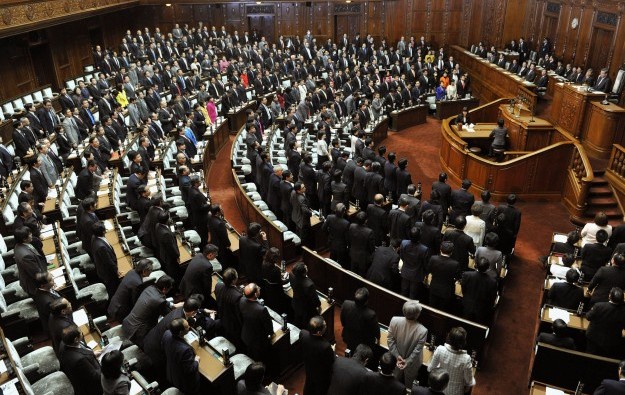Japan casino law passed likely 2H2018 earliest: Nomura
Apr 04, 2018 Newsdesk Japan, Latest News, Top of the deck

It is likely to be the second half of this year or the first half of 2019 before Japan passes its Integrated Resorts (IR) Implementation Bill, says a Tuesday note from Japanese brokerage Nomura.
The institution also stated – citing “local sources” – that four main locations were being discussed for the initial phase of up to three casino resorts: the cities of Osaka, Yokohama and Nagasaki, and the northern island of Hokkaido.
Nomura also clarified that it understood there would be an “exclusivity period of seven years,” on the first licences.
“We expect the length of the concessions to be similar to the initial seven-year exclusivity period, or approximately seven to 10 years, with the option for additional 10-year renewals,” wrote Nomura analysts Harry Curtis, Daniel Adam and Brian Dobson.
Following a meeting of the coalition parties on Monday, news had emerged that the implementation law would be reviewed seven years after its passage, but there was no mention in those reports of any exclusivity period on those first licences.
Regarding the timetable for the IR Implementation Bill – the measure necessary to make further progress on casino liberalisation in Japan – the largest governing group, the Liberal Democratic Party, recently expressed hopes that the bill could be introduced to parliament in May and passed by the end of the current legislative session on June 20. The LDP and its junior coalition partner Komeito announced on Tuesday consensus on the final two of 11 policy areas for casino implementation.
But the Nomura assessment suggests that the measure might not be cleared until either the so-called extraordinary session of parliament – which typically runs from early autumn to late November or early December – or the ordinary session of 2019, which is likely to run from New Year that year until the early summer.
“While the latest consensus could pave the way for a possible passing of the Implementation Bill before the end of the current parliamentary session on June 20, we believe the more likely scenario is that the bill is passed in second half 2018, first half 2019,” wrote Nomura’s analysts.
The institution’s team said that although the proposed fixed tax rate of 30 percent on casino gross gaming revenue – one of the political compromises reached on Tuesday by the governing coalition – “compares favourably” with Macau’s 39 percent effective gaming tax, rate it was still above Singapore’s “12- to 22-percent effective rate”.
Nomura added in its commentary that U.S.-based Las Vegas Sands Corp and MGM Resorts International – which respectively have majority ownership of Macau operators, with the former also having a Singapore licence – “seem to be best positioned to win” a licence in Osaka. Nomura thought MGM Resorts was also “well positioned” for a permit in Yokohama; while in Nagasaki it suggested Malaysia’s Genting group “appears to have the edge”. On Hokkaido, Nomura suggested U.S.-based Hard Rock International “has an edge over other operators”. It mentioned by name in that context Macau operator Galaxy Entertainment Group Ltd; Macau and Philippines operator Melco Resorts and Entertainment Ltd; and U.S.-based Caesars Entertainment Corp.
Related articles
-
 Broker cuts Macau 2H mass GGR by 3pct...
Broker cuts Macau 2H mass GGR by 3pct...Jul 26, 2024
-
 LET Group still seeks Hokkaido land...
LET Group still seeks Hokkaido land...Jul 11, 2024
More news
-
 Donaco EBITDA up y-o-y to above US$4mln...
Donaco EBITDA up y-o-y to above US$4mln...Jul 26, 2024
-
 HK listed Palasino upgrades Czech...
HK listed Palasino upgrades Czech...Jul 26, 2024
Latest News
Jul 26, 2024
Border-casino operator Donaco International Ltd has achieved a 164.17-percent year-on-year increase in its latest quarterly group earnings before interest, taxation, depreciation and amortisation...Sign up to our FREE Newsletter
 (Click here for more)
(Click here for more)
Pick of the Day
”We’ve got more traction outside of Macau at the moment. But Macau’s going be a bigger focus for us”
David Punter
Regional representative at Konami Australia
Most Popular
 Sheraton brand to exit Londoner Macao, to be Londoner Grand July 25, 2024
Sheraton brand to exit Londoner Macao, to be Londoner Grand July 25, 2024  Macau regulator probes unlicensed gaming agents July 24, 2024
Macau regulator probes unlicensed gaming agents July 24, 2024  Philippines gives 20k aliens in POGOs 60 days to leave July 25, 2024
Philippines gives 20k aliens in POGOs 60 days to leave July 25, 2024  Philippines-listed DigiPlus says not affected by POGO ban July 24, 2024
Philippines-listed DigiPlus says not affected by POGO ban July 24, 2024  Sands China 2Q EBITDA down q-o-q amid low hold, renovation July 25, 2024
Sands China 2Q EBITDA down q-o-q amid low hold, renovation July 25, 2024






